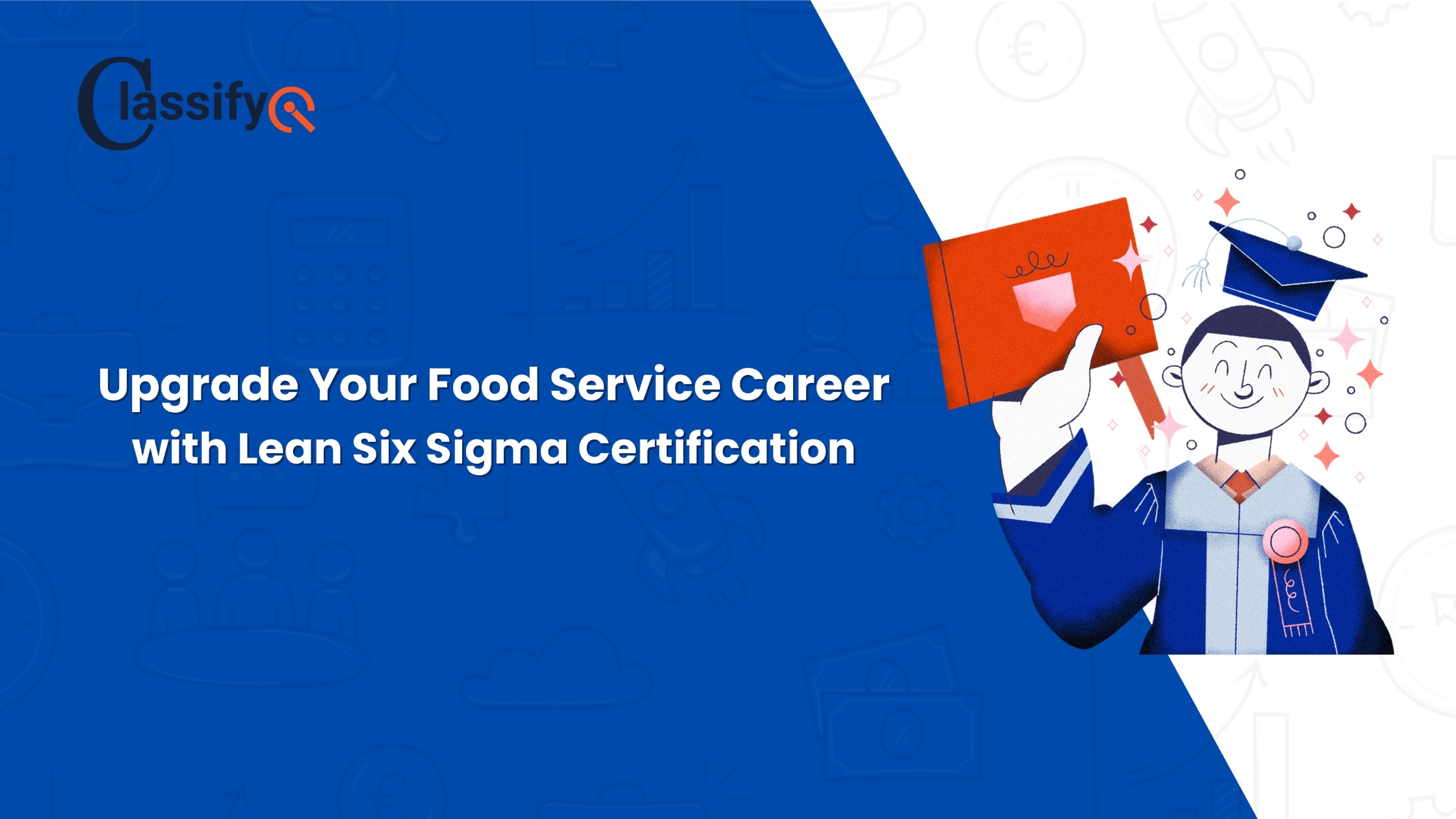
Get Lean Six Sigma Certified & Build a High-Paying Food Service Career
The food service industry has seen an impeccable growth decade and it’s expected to grow at an even larger pace in coming years. This also opens up for lots of career opportunities and it’s up to you to be ready for the same. An industry where precision, safety, and customer satisfaction define success Lean Six Sigma in food service has emerged as a transformative methodology. Nowday’s we are seeing that from restaurants to catering companies, and large-scale food producers are facing lots of challenges.
Challenges in Today’s Food Service Operations include:
- Resistance to change — Employees are often hesitant to adopt new systems.
- Lack of leadership support — Without managerial backing, process improvement loses direction.
- Inadequate training — Teams struggle without structured guidance or the right tools.
- Difficulty in data collection — Many kitchens and service chains fail to measure performance accurately.
- Scope creep — Misaligned project goals waste time and resources. Now, this is where Lean Six Sigma (LSS) helps in changing the whole story. Lean principle focuses on waste elimination whereas Six Sigma works on defect reduction. Together, they are revolutionising the system. In simple terms, it makes food operations smarter, faster, and more profitable.
Why Lean Six Sigma Is a Game-Changer for Food Businesses?
Waste Reduction for Higher Profitability
In the food business or any other industry, waste is a silent profit killer. The Lean methodology has identified 8 different waste types that are overproduction, waiting, excess inventory, defects, transport, motion, over-processing, and underutilized talent. Together all these drain your time and money. Food outlets can apply Just-In-Time (JIT) principles in order to align ingredient delivery with actual demand, cutting unnecessary storage costs. For example a restaurant that uses Lean Six Sigma can track ingredient usage data to prevent spoilage or overordering, boosting profitability while maintaining freshness.
Improving Food Quality and Customer Experience
In the food industry quality is directly linked to customer trust and brand loyalty. Quality control in the food industry can be achieved by using Lean Six Sigma. I ensure consistency and minimise variation in taste, temperature and presentation. Many Indian companies that use LSS have reported one-third reduction in customer complaints and First-Time-Right (FTR) success near 100%.
Streamlining FOH & BOH Operations
Lean Six Sigma can be used to optimize both Front of House (FOH) and Back of House (BOH) processes. It can be used to identify the bottleneck such as delayed table clearing or slow kitchen flow. Using this information managers can reorganize the operations such as assembly lines. Furthermore, by adopting a pull system you can ensure that meals are prepared only when required, minimizing food waste and maximizing efficiency.
How Lean Six Sigma Works with HACCP & GMP?
Understanding HACCP & GMP in Food Safety
HACCP (Hazard Analysis and Critical Control Points) and GMP (Good Manufacturing Practices) are the backbone of modern food safety standards. HACCP is used to identify potential hazards and GMP ensures that there’s cleanliness and consistency in food handling.
Lean Six Sigma as the Engine Behind Safety Efficiency
Lean Six Sigma amplifies HACCP and GMP effectiveness by linking hygiene and efficiency. It uses 5S methodology to achieve results:
- Sort: Remove expired or unnecessary items.
- Set in Order: Label and organize materials to prevent cross-contamination.
- Shine: Ensure proper sanitation schedules and chemical use.
- Standardize: Maintain consistent cleaning protocols across shifts.
- Sustain: Build a culture of hygiene and accountability.
This integration helps business to improve their compliance, reduce chemical waste and provide cost-effective cleaning operations
How Is Six Sigma Implemented? The DMAIC Method
Now that you have understood how LSS can truly change your operations, it is time to learn how it can be implemented using DMAIC framework:
Define — Identify Customer Pain Points
One should start with identifying the needs of customers. Understand various parameters be it taste, speed, or safety. Then teams can define project goals and develop a process map based on Critical-to-Quality (CTQ) elements.
Measure — Collect Operational Performance Data
Next, one needs to gather data on current performance. You can use metrics like DPMO (Defects Per Million Opportunities). This particular metric would help in determining how frequently mistake occurs in a process. For example, inaccurate order delivery or ingredient wastage can be quantified and tracked.
Analyze — Detect Root Causes in Service Flow
With the data collected, you can use statistical and process analysis tools, root causes of inefficiencies are uncovered. Furthermore, hypothesis testing and regression analysis can also help in identifying what truly impacts your performance, not just the surface level issues.
Improve — Implement High-Impact Enhancements
Based on analysis you can develop effective solutions and test through pilot projects. Whether it’s reorganizing kitchen layouts or redesigning service workflows, improvements are measured and refined before scaling.
Control — Maintain Quality and Avoid Rework
Finally, you can develop control plans that ensure sustainability. By using the Statistical Process Control (SPC) charts, managers can monitor real-time quality and prevent regression into old habits. Career & Salary Opportunities in Food Service with Six Sigma Like we have discussed, the food industry is expected to grow exponentially in coming years which would bring lots of good career and salary opportunities in the food service industry.
Career & Salary Opportunities in Food Service with Six Sigma
Like we have discussed, the food industry is expected to grow exponentially in coming years which would bring lots of good career and salary opportunities in the food service industry.
Updated Six Sigma Food Industry Salary Insights (2024/2025)
Lean Six Sigma certified professionals command strong salaries globally.
- Six Sigma Green Belt: ₹5,00,000–₹8,50,000 annually
- Black Belt: ₹10,00,000–₹25,00,000 (rising 15–20% by 2025)
- Master Black Belt: ₹20,00,000–₹45,00,000
Cities such as Bengaluru and Mumbai offer premium packages due to the high industrial demand.
Top Food Service Job Roles for Six Sigma Professionals
Lean Six Sigma Certification opens diverse career paths:
- Operational Excellence Roles: Process Excellence Manager, Continuous Improvement Manager
- Quality Control Roles: Quality Assurance Manager, Process Improvement Specialist
- Management & Consulting: Six Sigma Consultant, Project Manager, Production Manager
Leading Global Food Brands Hiring Certified Experts
Top MNCs are looking for skilled LSS experts. Brands such as Nestlé, Coca-Cola, PepsiCo and Tata Consumer Products actively recurit Lean Six Sigma professionals for roles in production, quality and supply chain management. Apart from that quick service restaurants chains like McDonald’s and Domino’s use Lean Six Sigma to streamline service operations.
Six Sigma Certification Levels in Food Service
There are different LSS Certification levels in the food service industry that you need to understand in order to make better career choices.
- White Belt (Frontline Staff) : This is an entry level certification that provides room to gain awareness about Lean Six Sigma fundamentals and contributes to minor improvement projects.
- Yellow Belt (Supervisors & Shift Leaders) : Supervisors understand key tools and support Green Belts by collecting data and identifying operational inefficiencies.
- Green Belt (Managers & Continuous Improvement Leads) : Green Belt Certification holders are highly valued for the cross-departmental process optimization. These are managers that lead improvement projects by applying advanced LSS tools and enhance overall productivity, reduce costs and improve quality.
- Black Belt (Operations & Quality Experts) : Black Belts are designated to handle complex enterprise level project, they also mentor Green belts and drive important changes across departments.
- Master Black Belt (Strategic Continuous Improvement Leaders) : This is the highest certification tier that one can achieve. They overlook the overall business objectives and culture.
The Future of Food Quality: AI, Data Analytics & Sustainability
Lean Six Sigma as the Foundation for Modern Food Service Technology
LSS + AI + Data Analytics together are actively transforming the whole industry. Data-driven mindset ensures efficient AI implementation, reducing redundancy and improving prediction accuracy.
Waste Reduction for a Sustainable Food Industry
LSS especially focuses on Muda, which is waste elimination which directly supports the environmental goals. By reducing the food wastage, optimizing resource use, and saving energy you can lower operational costs and environmental impact.
Why Choose ClassifyIQ for Lean Six Sigma Food Service Certification?
Classify IQ is a leading name when it comes to Lean Six Sigma Certification in India. Let’s see why we are the best choice for your career growth.
Industry Accreditation & Global Recognition
Our certifications are accredited by leading global bodies such as CSSC (Council for Six Sigma Certification) and IASSC (International Association for Six Sigma Certification). These credentials are recognised by multinational corporations and government bodies worldwide.
Real-World Training for Food Service Careers
We focus on providing practical, industry-aligned learning. With our courses you can learn how to apply Six Sigma principles to real operational challenges. We use case studies from restaurants, food manufacturing, catering, and quick-service chains, to provide our students with real world experience.
Affordable, Self-Paced & Lifetime-Valid Programs
ClassifyIQ offers Lean Six Sigma courses at highly affordable rates, in online modes and with lifetime validity. For example, our Six Sigma Green Belt Certification cost around ₹15,999 only. You get the best experience without compromising quality. Whether you’re looking for a Six Sigma certification in Delhi or want to take a Sigma course online from anywhere in the world, ClassifyIQ is your trusted partner for career excellence.
















